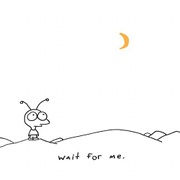- Electronic
- 2009
- Buy the CD
Reviewed by James B. Eldred
()
Describing the sound of Wait for Me is difficult. It's ambient inasmuch as it’s quiet and light on the beats, but it’s not a droning excursion into synthesizer consonance with no beats or melodies. Since none of the songs go much longer than four minutes, Moby never lets things meander, and there's always a sense of structure and theme which prevents the songs from delving into that dangerous new age/down-tempo area that so many electronic artists fall into when trying something outside of pure dance music.
The album begins with "Division," an entirely synthesizer-driven piece that has the tone of something an organist might play at a funeral. From there, the down-tempo "Pale Horses" begins, trip-hop beats backing more synthesizers while a woman (Amelia Zirin Brown) sings about returning to home "where all my family died" – so maybe the funeral vibe of the opening track was intentional.

Things get less depressing (for a bit, anyway), first with the beautiful instrumental "Shot in the Back of the Head" and then with "Study War," which features the only vocal sample of the album, a man preaching for "that day in which we will lay down our weapons and study war no more." It has a sound similar to the sample-based tracks on Play and 18, and for that reason it's probably one of the most accessible songs on Wait for Me.
Shockingly out of place (in a good way) is "Mistake," in which Moby invokes the spirits of Ian Curtis and David Bowie (who isn't actually dead, but whatever) to deliver his most powerful vocal performance to date. He out-Interpols Interpol in channeling the vibe of Joy Division, with his baritone voice and sparse guitar riffs. It's the most rocking Moby's been since Hotel or Animal Rights, but unlike those somewhat misguided efforts, he actually pulls it off, thanks to the song’s powerful lyrics and stark production.
Most of the second half of the record is instrumental, as well as brighter and less brooding. "Scream Pilots" actually comes close to having a dance beat, and the ascending synths might remind some of Moby's epic early instrumental "God Moving over the Face of the Waters." The final two songs of the album that feature vocals, "Wait for Me" and "Hope Is Gone," both continue the stark and somber vibe of "Pale Horses" as the women of both songs sing of loves lost over sparse pianos, synths and guitars. After that we're alone for three final instrumentals, all of which are just as quiet and mournful as the ones preceding.
Wait for Me is a dark ride. It's not a happy-go-lucky dance fest like Last Night or a rock record like Hotel. This is a bleak and mournful journey of introspection and remorse, but it’s also stunningly beautiful and melodic, as well as the most cohesive and honest record Moby's made since Play; in fact, it might be his best since his Everything Is Wrong. Just don't go into it expecting some happy dance music, or you're setting yourself up for the most depressing party ever.
You can follow us on Twitter and Facebook for content updates. Also, sign up for our email list for weekly updates and check us out on Google+ as well.













